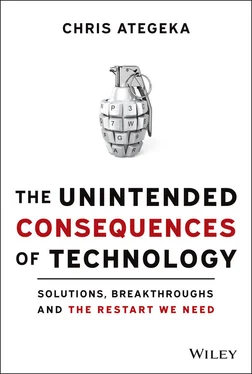But many people see the opposite. As of this writing, monopolies, acquisitions, and consolidations have seen Apple, Microsoft, Amazon, and Alphabet (Google) rise to what is now worth a combined net worth of $4 trillion. This is not sustainable. It's not a matter of if ; it's a matter of when . Residents will become increasingly resentful of this type of company and their leaders' resource hoarding, leading to an “egging” of some form or another. This will lead to the breakup of big tech into smaller entities. It will not be sexy or cool to be that big anymore.
Some capitalists argue that it is a good thing for people to be able to earn more and more. However, this ignores the diminishing marginal utility of wealth. A billionaire who gets an extra million sees little increase in economic welfare, but that $1 million spent on healthcare would provide a much bigger increase in social welfare.
Perhaps this is the reason we do need to reform or replace the capitalistic market altogether. One thing is true—we need to rethink the incentive structures that align well with humanity and our planet. What if there was a cap on how much money one can make through capitalism? Let's say that number is $2 billion. Then we would name a dog park after you with a sign that says, “You Won Capitalism.” Any subsequent dollars you make past the cap, you spend it on lifting people out of poverty and taking care of the planet. The more you do of the latter, the more street cred you get in society.
Last but not least of the unintended consequences of capitalism are the boom-and-bust cycles. Bust cycles in particular are very debilitating to society. In 100 years, we've seen the 1929 stock market crash, the 1989 bust caused by the savings and loan crisis, the 2001 recession caused by stock market crash and high-interest rates, the 2008 mortgage housing crisis, and finally the economic fallout of the 2020 COVID-19 pandemic.
These cycles fall into four phrases: boom, which is the aggressive expansion; peak, an inflection point where the economy stops expanding; bust , the contraction season; and the end of the bust , which is the inflection point where the economy stops contracting and begins to expand again (Amadeo, 2020).
The boom and bust cycles are caused by three forces—the law of supply and demand, the availability of financial capital, and future expectations. Technology companies, just like any other business operating in a capitalist economy, have a tendency to fall into booms and busts, with painful recessions and mass unemployment. These bust cycles affect the people at the bottom the hardest because most of them survive on paycheck to paycheck, thus the unpredictability of earnings is the biggest problem.
HOW TO MITIGATE UCOTS AND REIMAGINE CAPITALISM
We just discussed the unintended consequences of capitalism. Anyone can scream and tell you the house is on fire, but what can we do about it? Besides bringing the fire hose and putting out the fire, what else can be done to make sure we prevent the fire from happening in the first place? The following sections are some thoughts and ideas about how we could reactively and proactively mitigate the UCOTs of capitalism.
Capitalism versus Carbon Emission Regulations
The free market can only take us where we need to go. Negative externalities such as carbon pollution must be properly priced and policed. The rules of the game need to be such that competition is free, fair, and respectful of the health of humanity and our planet. Only then do we have a chance at saving the planet.
Unfortunately, markets do not police themselves. They must be balanced by transparent, capable, democratically accountable governments. As you will see in Chapter 2, we need to strengthen the power of regulatory bodies, which are slowly diminishing. In tech companies, regulations are demonized and companies do all they can to keep them at the bare minimum. They couldn't care less if they existed at all. Meanwhile, these same companies care a great deal about their shareholder returns, leading to the rise of shareholder primacy. With more money in the hands of the shareholders and the leadership, in comes lobbying and an increasing role of money in politics. This weakening and systematic attack on government as a necessary or effective institution to regulate capitalism is largely absent.
As a result, one of the fastest routes to profitability is often to persuade politicians to write the rules in your favor. Firms feel free to dump greenhouse gases into the atmosphere, for example, while spending hundreds of millions of dollars to lobby against carbon regulation.
We can rebuild trust in the political system, and with it a government that is genuinely responsive to ordinary people, if we can get the money out of politics and stop tolerating business attacks on government. We need to enable government to regulate fossil fuel emissions and provide positive incentives to encourage corporations to embrace low-carbon solutions. That's why I believe getting money out of politics and enforcing carbon emission policing are both very vital in mitigating the UCOTs of capitalism.
The current wave of capitalism was designed around the fallacy of the “the lone hero” entrepreneur, the mindset of the unicorn (a privately held startup company valued at over $1 billion), and hockey stick–type of growth. This leads to monopolies, zero sum game, and winner take all. It's no surprise that there are going to be a few winners and many losers. We can all agree that the system I just described has been perfected and it's working too well for a few—leaving the majority of the population behind. We need a better system.
Desperate times call for radical measures. This starts with redesigning a system that was built to redistribute wealth and power from the many to the few. If it's done correctly, working people and their families will not only survive, but thrive, from the jobs created by massive public investment in restructuring our systems such as the energy grid and transforming our world. And we know the only ones willing to make that demand are those of us who are currently being squeezed by private interests for every last drop of profit. It will take all of us. Rather than trying to fix capitalism, we should be seeking to modify it or replace the blueprint that created it.
Stakeholder Capitalism versus Shareholders
In the United States, the top 1 percent of households own more wealth than the bottom 90 percent combined Ingraham, (2017). This is in part a result of a winner-takes-all mindset in a capitalistic market.
Furthermore, there is this myth of “pull yourself up by your bootstraps,” which assumes that we all come from the same starting point. Yet racism, sexism, and classism are all ignored. It's hard to win a race if you start off shackled and have to run through fire while others use turbo-charged engines to get there.
It's time for all-hands-on-deck intervention to rethink our capitalistic system and make it work for everyone. That's why I am a proponent of stakeholder capitalism , which cares about humanity and our planet, rather than the current shareholder capitalism, which focuses on wealth maximization for a small number of elite individuals who own the company.
Preventing the Negative UCOTs
The COVID-19 pandemic has given us an opportunity to pause and think about the systems we want moving forward. Big ships are not easy to turn, but they are not impossible to turn either. We need to create a version of capitalism that focuses on the longer term and on the common good. That's why now is the right time to come up with innovative ideas.
Читать дальше












